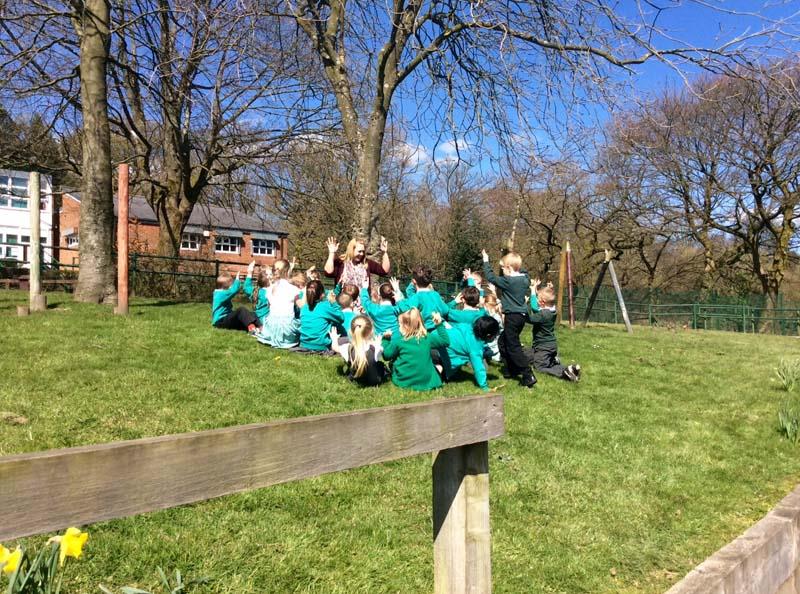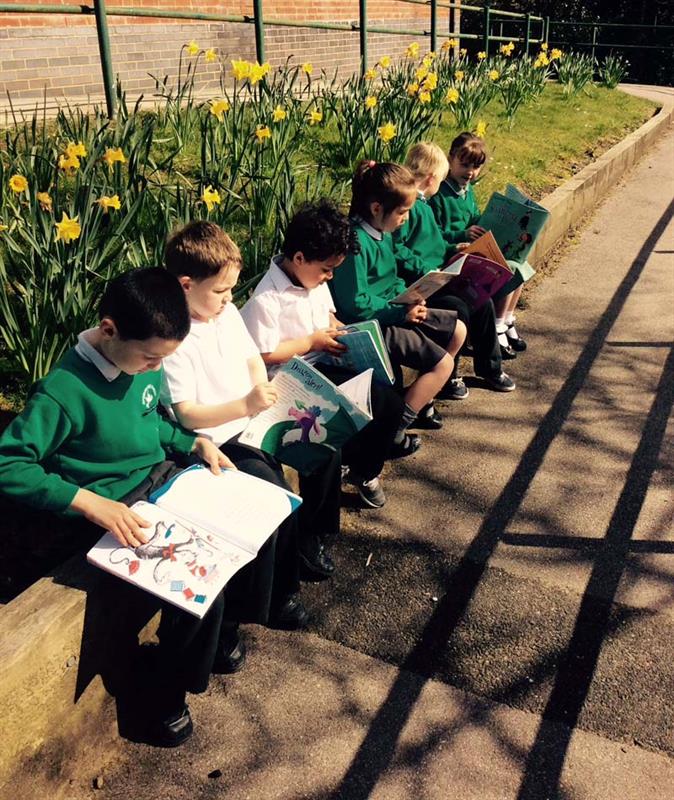
Ruth Dean is headteacher at Johnson Fold Community Primary School in Bolton. She has overseen the blossoming of this school from it almost going into special measures only eight weeks after she arrived to more recently receiving an outstanding judgement.
Their February 2016 report is more colourful than many of the Ofsted reports that you read, even the outstanding ones. Phrases such as “inject plenty of fun into learning”, “engage and capture pupils’ attention”, “a love of learning that percolates through the school” and “oasis of learning and care” have delighted the team at Johnson Fold.
One of the reasons perhaps that this report is so detailed and reflective of the school is that the school has made a priority not only of ensuring standards are right in the core subjects, but of ensuring a well-rounded and balanced education as well – a significant part of which is their approach to learning outside the classroom.
The grounds
The school is lucky in that it does have extensive grounds. At the back of the school there is a forest area which was established in 1953. There the children build huts, cook on fires and use tree swings. At the front of the school a hill leads down into the playground which has an astro-turfed area where the children can play football. Johnson Fold also has the luxury of its own vegetable garden on site.
For some schools having so much land could be seen as a problem of maintenance rather than an asset, but to Ms Dean and her staff it has enabled them to tackle the National Trust’s “50 things to do before you are 11 and three-quarters”. Children build a den (no.4), go bird watching (no.44), play conkers (no.10), and even go on a nature walk at night (no. 40) as part of their year 6 residential.
Off to the forest

Although all parts of the school grounds are valued and well-used, it is perhaps the forest that is recognised to be a particularly rich opportunity for the children here.
Every class has access to the forest area at least once every half-term whatever the weather. “It’s really important that the children have these opportunities,” Ms Dean explained. “You get to see them in a different context and it brings out the best in them too. You get to see aspects of their character such as resilience and resourcefulness that you perhaps hadn’t noticed before. There are some children who are ‘nature smart’ but might not find it quite so easy in the classroom. It’s like taking a child on a residential, you can suddenly see a different side to their personality and their capacity.”
For one afternoon a week the forest is timetabled. The retired site manager and a teaching assistant work with the children alongside the class teacher. The activities they do in the forest are usually linked to the curriculum topic or taken directly from the 50 things to do list.
Ms Dean continued: “We did explore the possibility of having a forest school to begin with, but we felt that it was focused more on targeted children rather than being a core part of the curriculum. We wanted all our children to experience and make good use of the forest.”
Food and nutrition
The exploration of the outdoors does not stop in their own school grounds. Johnson Fold has developed good links with Moss Bank Park in Bolton. The Hive at Moss Bank Park is a local food-growing project and aims to develop interactive food growing trails. The children from Johnson Fold have worked with them on a number of activities including creating a bee trail through the park and baking bread.
Each year The Hive works with a different year group on a different project all with the aim of encouraging others to find out more about growing their own food.
Back at school, much of what the children learn with The Hive can also be put into practice. Although it has been a quiet period for the vegetable garden over the winter, they are now ready to start building up its use and it will help to stock the cupboards in their children’s kitchen.
“We’ve purchased six ovens for the kitchen and we’re hoping to cook using the fresh ingredients from the vegetable garden,” explained Ms Dean. “The children will then be able to take home the recipe and hopefully they will continue to make the dish and encourage parents to build it into their weekly menu.”
The organisation, Urban Outreach in Bolton, is helping with the cooking activities at the school thanks to a grant they have been given. Talking to Ms Dean it becomes apparent just how many different local organisations the school has links with. Not only does this bring enrichment activities to the school, but it establishes it as an integral part of their community.
The playground

Johnson Fold’s playground is divided into three distinct areas. The two-year-olds have their own playground designed around a woodland theme. One of the features it includes is a bark tray for creative play – an interesting development from the usual sandpit.
An early years playground has a mud kitchen and wooden storytelling chair and the older children then have possession of the third playground. This includes an area of astro-turf which is specifically designed for playing football. This designation prevents football encroaching on other activities and also allows for skills teaching as well as games.
One of the school’s teaching assistants is a trained football coach and is out there most lunchtimes encouraging and training the children who want to take part. The area is floodlit and two matches can take place at the same time. Any trouble and it’s the red or yellow card.
Everyone enjoys their lunchtimes and play. The school has invested in building lunchtime supervision into the timetables of the teaching assistants and there are only two midday supervisors in addition to the core staff on duty.
An idyllic setting with its challenges
“You can tell when a new child arrives,” says Ms Dean. “The children don’t understand or don’t know how we do it here, yet. It’s not long usually before they’ve settled in.”
Johnson Fold might have some wonderful grounds but it’s not located in a leafy suburb. Two-thirds of the pupils are eligible for the Pupil Premium and the school receives international new arrivals who temporarily attend the school due to short term accommodation placements in the local community.
There is no sense that this school is dealing with deprivation or that they feel their children are impoverished or a challenge. In fact, Ms Dean is keen to emphasise the respect that the school has for the community and the pride they have too in themselves and their outstanding school.
Nor is outdoor education a bolt-on to the real work that they do. “The teachers here make learning fun,” Ms Dean added. “They use the school grounds to provide stimulation and excitement according to their own expertise. We aim for our children to take with them a suitcase of happy memories.”
- Suzanne O’Connell is a freelance education writer and former primary school headteacher.
Further links
- Fifty things to do before you’re 11¾: www.50things.org.uk
- Urban Outreach: www.urbanoutreach.co.uk
- The Hive, Moss Bank Park: www.lancswt.org.uk/hive
